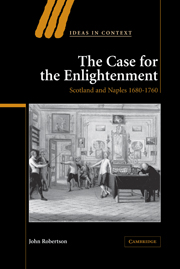Book contents
- Frontmatter
- Contents
- Preface
- 1 The case for the Enlightenment
- 2 Scotland and Naples in 1700
- 3 The intellectual worlds of Naples and Scotland 1680–c.1725
- 4 The predicament of ‘kingdoms governed as provinces’
- 5 Vico, after Bayle
- 6 Hume, after Bayle and Mandeville
- 7 The advent of Enlightenment: political economy in Naples and Scotland 1730–1760
- Conclusion: the Enlightenment vindicated?
- Bibliography
- Index
- IDEAS IN CONTEXT
4 - The predicament of ‘kingdoms governed as provinces’
Published online by Cambridge University Press: 15 October 2009
- Frontmatter
- Contents
- Preface
- 1 The case for the Enlightenment
- 2 Scotland and Naples in 1700
- 3 The intellectual worlds of Naples and Scotland 1680–c.1725
- 4 The predicament of ‘kingdoms governed as provinces’
- 5 Vico, after Bayle
- 6 Hume, after Bayle and Mandeville
- 7 The advent of Enlightenment: political economy in Naples and Scotland 1730–1760
- Conclusion: the Enlightenment vindicated?
- Bibliography
- Index
- IDEAS IN CONTEXT
Summary
THE SPANISH SUCCESSION CRISIS
By 1700, it has been suggested, Neapolitan men of letters were aware that the currents of scepticism, Epicureanism, and Augustinianism flowing so strongly from France had the potential to transform the understanding of man's place in this world. Scots were slower to appreciate this potential, quite possibly because those responsible for intellectual leadership were reluctant to engage with the new thinking; nevertheless they too were to recognise it eventually. But why should Neapolitans and Scots have become particularly interested in understanding man's place in this world? What made this increasingly their chief intellectual preoccupation? An answer, I shall suggest, lies in the incentive to thought offered by the circumstances of the two kingdoms. Before Neapolitans and Scots turned to systematic reflection on human society and its history, they had already devoted heir intellectual energies to discussion of the specific political and economic problems which they found in their own countries. Prompted by the onset of political, and in the Scottish case also economic, crisis in the late 1690s, both Neapolitan and Scottish observers began to consider the reasons for their countries' predicaments, and the means by which they might hope to escape them. Moreover it was not simply the subject matter of these discussions which pointed the Neapolitans and the Scots towards the more general analysis of the human condition; the debates also served as a testing ground of the existing conceptual resources for such analysis.
- Type
- Chapter
- Information
- The Case for The EnlightenmentScotland and Naples 1680–1760, pp. 147 - 200Publisher: Cambridge University PressPrint publication year: 2005



